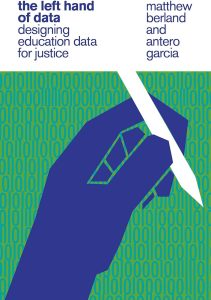By Laurel White
Education data can be harnessed to promote groundbreaking and energizing movements toward play, creativity, and social justice in the classroom, according to a new book from a School of Education faculty member.
The book, “The Left Hand of Data,” was released this week by The MIT Press. It is the latest release from Matthew Berland, professor in the Department of Curriculum and Instruction. Berland says the book provides a roadmap for making education more responsive to individual students’ needs, while centering the concepts of social justice and more creative, playful educational experiences in and out of the classroom.

“A lot of data science in education is about aggregating kids and treating them as one normative kid — even places that care about equity treat kids in normative ways,” he says. “Part of the idea of this book is looking into how we can use data analysis and things we’ve learned from research and different perspectives to think about the role of the individual, their background, and their context to inform how we teach and learn, and how that can be playful and engaging.”
Berland co-authored “The Left Hand of Data” with Antero Garcia, an associate professor of education at Stanford University. Garcia is a national thought leader and leading scholar of creative approaches to education, including speculative imagination and healing in educational research. He is the author of more than a dozen books about innovation in literacies, play, and civics and is the vice president of the National Council of Teachers of English (NCTE).
Throughout the book, Berland and Garcia urge readers to consider more creative ways to generate and use data about students’ activities and achievement.
“If we think more creatively about what we want out of data, we can have measurements that incentivize the things we care about, like creative and playful learning,” Berland says.

For example, the authors urge educators to move past a world in which students are given one short reading aptitude test that dictates and confines students’ classroom reading activity for an entire academic year. They contend tests that produce assessments of student aptitude far below their grade level are not only demoralizing and potentially shaming for students, but often racially inequitable.
“Data, its intended use, and the unintended consequences of its collection shape nearly every aspect of how students experience and participate in the world,” they write.
Berland and Garcia also discuss the value of informal learning environments, like libraries and museums, and game-based learning. They outline how those spaces and approaches can provide valuable opportunities, how data is produced in those areas, and how it could be better.
In fact, “The Left Hand of Data” encourages readers to think critically about the entirety of the current education data ecosystem: what is collected, how it is collected, its inherent biases, and how it is used to shape students’ future. It encourages readers to think critically about how each of those things may evolve amid advancements in artificial intelligence and machine learning, and how they may be changed or subverted.
Yasmin B. Kafai, professor of education at the University of Pennsylvania, says “The Left Hand of Data” offers a refreshing new perspective on the power of data — for better and worse — in educational settings.
“Berland and Garcia offer a critical expansive examination of today’s obsession with data for tracking and assessment in educational research and practice, proposing instead justice-driven approaches that acknowledge young people’s identities and creativity,” she says.
At the end of each section in the book, the authors offer readers opportunities to play games, download activities, and write code. Berland says that playful engagement in the book — along with the authors’ light, humorous tone throughout — is a nod to the goal that animates all of his and Garcia’s academic work.
“This is all about empowering more classrooms to be humane, student-focused, and equity-centered,” he says. “We are not arguing against data analysis in the classroom, we just think it could be infinitely better.”
Berland’s previous book, “Playful Testing,” explored how to build and use games to effectively measure students’ learning. He is the founder and director of the Complex Play Lab and the UW Game Design Program.
More information about “The Left Hand of Data: Designing Education Data for Justice” is available here. The open access edition of the book was made possible by funding and support from MIT Press Direct to Open.